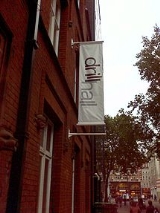
The Drill Hall
Encyclopedia
The Drill Hall is a theatrical venue in Bloomsbury
in the London Borough of Camden
, just to the east of Tottenham Court Road
. It contains rehearsal rooms and meeting rooms, and two small theatres - the 200-seat Drill Hall 1 and a 50-seat studio space, known as Drill Hall 2. Its name derives from its original use, as a drill hall
for the Bloomsbury Rifles. It became a theatre in the 1980s after many years of being used as a rehearsal hall and, in the 1960s, as an art gallery for the Tate Gallery
’s exhibition of the McAlpine
Collection. It has a notable artistic history, in the 1900s, Diaghilev and the Ballet Russes rehearsed here. During World War II
it was used for Ralph Reader
's Gang Show
s.
Since 1984, The Drill Hall has particularly supported production of theatrical and artistic works with gay and lesbian
themes. It has also been one of several venues used by the BBC
as a studio for radio shows which are recorded in front of a live studio audience.
The Drill Hall has an annual turnover of £1.25 million; previously this was supported with £250,000 of Arts Council
funding. In late 2007, the Council announced it was withdrawing this funding to concentrate its funding on other ventures. Similar fates befell 194 other arts organisations.
Bloomsbury
-Places:* Bloomsbury is an area in central London.* Bloomsbury , related local government unit* Bloomsbury, New Jersey, New Jersey, USA* Bloomsbury , listed on the NRHP in Maryland...
in the London Borough of Camden
London Borough of Camden
In 1801, the civil parishes that form the modern borough were already developed and had a total population of 96,795. This continued to rise swiftly throughout the 19th century, as the district became built up; reaching 270,197 in the middle of the century...
, just to the east of Tottenham Court Road
Tottenham Court Road
Tottenham Court Road is a major road in central London, United Kingdom, running from St Giles Circus north to Euston Road, near the border of the City of Westminster and the London Borough of Camden, a distance of about three-quarters of a mile...
. It contains rehearsal rooms and meeting rooms, and two small theatres - the 200-seat Drill Hall 1 and a 50-seat studio space, known as Drill Hall 2. Its name derives from its original use, as a drill hall
Drill hall
A drill hall is a place such as a building or a hangar where soldiers practice and perform military drill. In the United Kingdom and Commonwealth, the term was also used for the whole headquarters building of a military reserve unit, which usually incorporated such a hall...
for the Bloomsbury Rifles. It became a theatre in the 1980s after many years of being used as a rehearsal hall and, in the 1960s, as an art gallery for the Tate Gallery
Tate Gallery
The Tate is an institution that houses the United Kingdom's national collection of British Art, and International Modern and Contemporary Art...
’s exhibition of the McAlpine
McAlpine
-People:*Alistair McAlpine, Baron McAlpine — British politician*Jennie McAlpine — British actress*Katherine McAlpine — American science writer and rap performer*Sir Robert McAlpine, 1st Baronet — British civil engineer, known as 'Concrete Bob'...
Collection. It has a notable artistic history, in the 1900s, Diaghilev and the Ballet Russes rehearsed here. During World War II
World War II
World War II, or the Second World War , was a global conflict lasting from 1939 to 1945, involving most of the world's nations—including all of the great powers—eventually forming two opposing military alliances: the Allies and the Axis...
it was used for Ralph Reader
Ralph Reader
William Henry Ralph Reader CBE , known as Ralph Reader, was a British actor, theatrical producer and songwriter, best known for staging the original Gang Show, a variety entertainment presented by members of the Scouting Movement.Reader was born in Crewkerne, Somerset, England, the son of a...
's Gang Show
Gang Show
A Gang Show is a theatrical performance with a cast of youth members of Scouts and sometimes Guides too, by invitation. Adult leaders and parents help out behind the scenes. The aim of the shows is to give young people in Scouting and Guiding the opportunity to develop performance skills and...
s.
Since 1984, The Drill Hall has particularly supported production of theatrical and artistic works with gay and lesbian
LGBT
LGBT is an initialism that collectively refers to "lesbian, gay, bisexual, and transgender" people. In use since the 1990s, the term "LGBT" is an adaptation of the initialism "LGB", which itself started replacing the phrase "gay community" beginning in the mid-to-late 1980s, which many within the...
themes. It has also been one of several venues used by the BBC
BBC
The British Broadcasting Corporation is a British public service broadcaster. Its headquarters is at Broadcasting House in the City of Westminster, London. It is the largest broadcaster in the world, with about 23,000 staff...
as a studio for radio shows which are recorded in front of a live studio audience.
The Drill Hall has an annual turnover of £1.25 million; previously this was supported with £250,000 of Arts Council
Arts Council England
Arts Council England was formed in 1994 when the Arts Council of Great Britain was divided into three separate bodies for England, Scotland and Wales. It is a non-departmental public body of the Department of Culture, Media and Sport...
funding. In late 2007, the Council announced it was withdrawing this funding to concentrate its funding on other ventures. Similar fates befell 194 other arts organisations.

